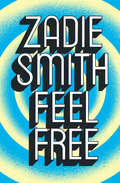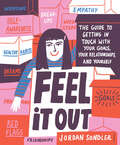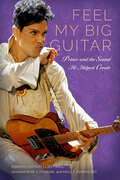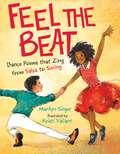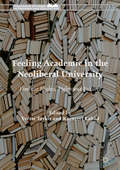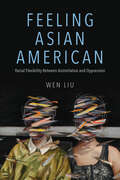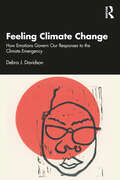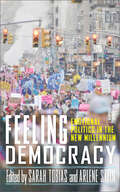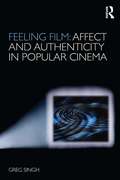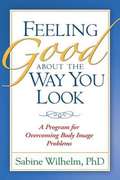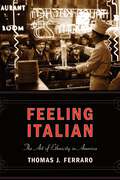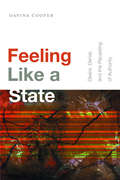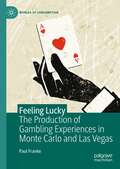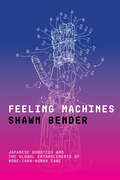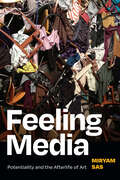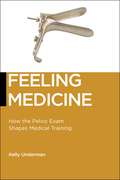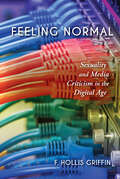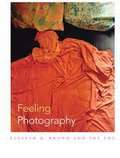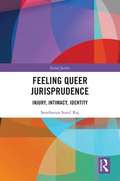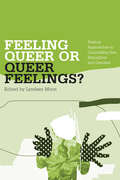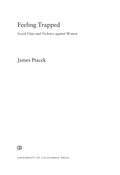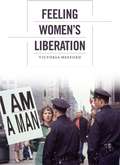- Table View
- List View
Feel Free
by Zadie SmithA timely, powerful collection of essays from one of our sharpest minds and most sparkling stylists. <p><p> How much joy can a person tolerate? How many kinds of boredom make up a life? Who owns the story of black America? Should Justin Bieber be more like Socrates? And why is there a dead art collector floating in the swimming pool? <p> Dazzlingly insightful, explosively funny and ever-timely, Zadie Smith is back with a second unmissable collection of essays. From German Old Masters to the new masters of East Coast rap, from social networks opening lines of communication to national referenda closing doors, Feel Free reaches out in all directions and draws back a rich feast of ideas. Here pop culture, high culture, social change and political debate all get the Zadie Smith treatment: dissected with razor-sharp intellect, set brilliantly against the context of the utterly contemporary, and considered with a deep humanity and compassion. <p> With the easy intimacy of a local and the piercing clarity of an outsider, Feel Free casts a sharp critical eye over the creative luminaries that have shaped our world: from J. G. Ballard to Karl Ove Knausgaard, Orson Welles to Charlie Kaufman, Joni Mitchell to Beyonce, and far beyond. And it considers the points of contact where the author herself meets this world, where the political meets the personal and critique meets memoir. This electrifying new collection showcases Zadie Smith as a true literary powerhouse, demonstrating once again her credentials as an essential voice of her generation.
Feel It Out: The Guide to Getting in Touch with Your Goals, Your Relationships, and Yourself
by Jordan SondlerNot everything is about you (but this book is).Still figuring it all out? Cool, so are we. Feel It Out is a guide to celebrating where you are now, even if heartbreaks, career setbacks, growing pains, and preconceptions about where you should be by now are getting in your way. Think of this as a coming-of-age book for adults, a self-love pep talk that will teach you how to get to the core of who you are and find out what you truly want, to cultivate a hot and heavy relationship with YOU, first and foremost. This approachable and empowering book offers everything you need to cut through the noise, feel your feelings, treat yourself well, and get yourself right, so you can get out there and live your best and most exciting life.
Feel My Big Guitar: Prince and the Sound He Helped Create (American Made Music Series)
by Judson L. Jeffries, Shannon M. Cochran, and Molly ReinhoudtContributions by Ignatius Calabria, H. Zahra Caldwell, Brian Jude de Lima, Sabatino DiBernardo, William Fulton, Antonio Garfias, Judson L. Jeffries, Tony Kiene, Molly Reinhoudt, Fred Shaheen, and Karen Turman With his signature blend of genres and lyrics that touch on myriad societal issues, the artist Prince (1958–2016) has challenged and captivated the minds and hearts of countless listeners. Feel My Big Guitar: Prince and the Sound He Helped Create is a wide-ranging collection that seeks to place Prince at the center of contemporary musical scholarship, putting him in proper cultural and political context. This edited volume includes a mix of essays and reflections by scholars and fans, as well as interviews with people who worked with and knew Prince personally. Employing a blend of methodologies, contributors offer a body of fresh, intriguing, thought-provoking, and mind-bending work about Prince—an artist whose music exemplified those very characteristics.The volume examines Prince's musical influences, his rivalries (both real and imagined), and instrumental eroticism. It includes enlightening interviews with early mentor Pépe Willie and Gayle Chapman, Prince’s first female bandmate. These personal reflections and interviews grant readers a unique lens through which to view Prince, enriching our overall understanding of the man. Ultimately, Feel My Big Guitar serves as a space for sharing musicological analysis and memories about an artist whose work has touched and inspired so many. Years in the making, this is the first book in an ongoing scholarly project, PrincEnlighteNmenT: A Study of Society through Music, intended to investigate and reveal the full spectrum of Prince’s life and work.
Feel the Beat: Dance Poems that Zing from Salsa to Swing
by Marilyn SingerAn irresistible book of poems about dancing that mimic the rhythms of social dances from cha-cha to two-step, by the acclaimed author of Mirror Mirror Marilyn Singer has crafted a vibrant collection of poems celebrating all forms of social dance from samba and salsa to tango and hip-hop. The rhythm of each poem mimics the beat of the dances&’ steps. Together with Kristi Valiant&’s dynamic illustrations, the poems create a window to all the ways dance enters our lives and exists throughout many cultures. This ingenious collection will inspire readers to get up and move!Included with the e-book is an audio recording of the author reading each poem accompanied by original music.
Feel the Grass Grow: Ecologies of Slow Peace in Colombia
by Angie LederachOn November 24, 2016, the Colombian government and the Revolutionary Armed Forces of Colombia signed a revised peace accord that marked a political end to over a half-century of war. Feel the Grass Grow traces the far less visible aspects of moving from war to peace: the decades of campesino struggle to defend life, land, and territory prior to the national accord, as well as campesino social leaders' engagement with the challenges of the state's post-accord reconstruction efforts. In the words of the campesino organizers, "peace is not signed, peace is built." Drawing on nearly a decade of extensive ethnographic and participatory research, Angela Jill Lederach advances a theory of "slow peace." Slowing down does not negate the urgency that animates the defense of territory in the context of the interlocking processes of political and environmental violence that persist in post-accord Colombia. Instead, Lederach shows how the campesino call to "slowness" recenters grassroots practices of peace, grounded in multigenerational struggles for territorial liberation. In examining the various layers of meaning embedded within campesino theories of "the times (los tiempos)," this book directs analytic attention to the holistic understanding of peacebuilding found among campesino social leaders. Their experiences of peacebuilding shape an understanding of time as embodied, affective, and emplaced. The call to slow peace gives primacy to the everyday, where relationships are deepened, ancestral memories reclaimed, and ecologies regenerated.
Feeling Academic in the Neoliberal University: Feminist Flights, Fights and Failures (Palgrave Studies in Gender and Education)
by Yvette Taylor Kinneret LahadThis book offers a contemporary account of what it means to inhabit academia as a privilege, risk, entitlement or a failure. Drawing on international perspectives from a range of academic disciplines, it asks whether feminist spaces can offer freedom or flight from the corporatized and commercialized neoliberal university. How are feminist voices felt, heard, received, silenced, and masked? What is it to be a feminist academic in the neoliberal university? How are expectations, entitlements and burdens felt in inhabiting feminist positions and what of 'bad feeling' or 'unhappiness' amongst feminists? The volume consider these issues from across the career course, including from 'early career' and senior established scholars, as these diverse categories are themselves entangled in academic structures, sentiments and subjectivities; they are solidified in, for example, entry and promotion schemes as well as funding calls, and they ask us to identify in particular stages of 'being' or 'becoming' academic, while arguably denying the possibility of ever arriving. It will be essential reading for students and researchers in the areas of Education, Sociology, and Gender Studies.
Feeling Asian American: Racial Flexibility Between Assimilation and Oppression (NWSA / UIP First Book Prize)
by Wen LiuAsian Americans have become the love-hate subject of the American psyche: at times celebrated as the model minority, at other times hated as foreigners. Wen Liu examines contemporary Asian American identity formation while placing it within a historical and ongoing narrative of racial injury. The flexible racial status of Asian Americans oscillates between oppression by the white majority and offers to assimilate into its ranks. Identity emerges from the tensions produced between those two poles. Liu dismisses the idea of Asian Americans as a coherent racial population. Instead, she examines them as a raced, gendered, classed, and sexualized group producing varying physical and imaginary boundaries of nation, geography, and citizenship. Her analysis reveals repeated norms and acts that capture Asian Americanness as part of a racial imagination that buttresses capitalism, white supremacy, neoliberalism, and the US empire. An innovative challenge to persistent myths, Feeling Asian American ranges from the wartime origins of Asian American psychology to anti-Asian attacks to present Asian Americanness as a complex political assemblage.
Feeling Backward: Loss and the Politics of Queer History
by Heather LoveFeeling Backward weighs the costs of the contemporary move to the mainstream in lesbian and gay culture. While the widening tolerance for same-sex marriage and for gay-themed media brings clear benefits, gay assimilation entails other losses--losses that have been hard to identify or mourn, since many aspects of historical gay culture are so closely associated with the pain and shame of the closet.<P> Feeling Backward makes an effort to value aspects of historical gay experience that now threaten to disappear, branded as embarrassing evidence of the bad old days before Stonewall. It looks at early-twentieth-century queer novels often dismissed as "too depressing" and asks how we might value and reclaim the dark feelings that they represent. Heather Love argues that instead of moving on, we need to look backward and consider how this history continues to affect us in the present.<P> Through elegant readings of Walter Pater, Willa Cather, Radclyffe Hall, and Sylvia Townsend Warner, and through stimulating engagement with a range of critical sources, Feeling Backward argues for a form of politics attentive to social exclusion and its effects.
Feeling Climate Change: How Emotions Govern Our Responses to the Climate Emergency
by Debra J. DavidsonExamining the social response to the mounting impacts of climate change, Feeling Climate Change illuminates what the pathways from emotions to social change look like—and how they work—so we can recognize and inform our collective attempts to avert further climate catastrophe.Debra J. Davidson engages with how our actions are governed by a complex of rules, norms, and predispositions, central among which operates our emotionality, to assess individual and collective responses to the climate crisis, applying a critical and constructive analysis of human social prospects for confronting the climate emergency in manners that minimize the damage and perhaps even enhance the prospects for meaningful collective living.Providing a crucial understanding of our emotionality and its role in individual behaviour, collective action, and ultimately in social change, this book offers researchers, policymakers, and citizens essential insights into our personal and collective responses to the climate emergency.
Feeling Democracy: Emotional Politics in the New Millennium (The Feminist Bookshelf: Ideas for the 21st Century)
by Sarah Tobias Arlene Stein Nermin Allam Kathryn Abrams Noëlle McAfee Ciara Torres-Spelliscy Kirin Gupta Ileana NachescuCultural critic Lauren Berlant wrote that “politics is always emotional,” and her words hold especially true for politics in the twenty-first century. From Obama to Trump, from Black Lives Matter to the anti-abortion movement, politicians and activists appeal to hope, fear, anger, and pity, all amplified by social media. The essays in Feeling Democracy examine how both reactionary and progressive politics are driven largely by emotional appeals to the public. The contributors in this collection cover everything from immigrants’ rights movements to white nationalist rallies to show how solidarities forged around gender, race, and sexuality become catalysts for a passionate democratic politics. Some essays draw parallels between today’s activist strategies and the use of emotion in women-led radical movements from the 1960s and 1970s, while others expand the geographic scope of the collection by considering Asian decolonial politics and Egyptian pro-democracy protests. Incorporating scholarship from fields as varied as law, political science, philosophy, psychoanalysis, and history, Feeling Democracy considers how emotional rhetoric in politics can be a double-edged sword—often wielded by authoritarian populists who seek to undermine democracy but sometimes helping to bring about a genuine renewal of participatory democracy.
Feeling Film: Affect And Authenticity In Popular Cinema
by Greg SinghCinema has the capacity to enflame our passions, to arouse our pity, to inspire our love. Feeling Film is a book that examines the emotional encounters found in contemporary popular cinema cultures. Examining melodrama, film noir, comic book franchises, cult indie movies and romantic comedy within the context of a Jungian-informed psychology and contemporary movements in film-philosophy, this book considers the various kinds of feelings engendered by our everyday engagements with cinema. Greg Singh questions the popular idea of what cinema is, and considers what happens during the anticipation and act of watching a movie, through to the act of sharing our feelings about them, the reviewing process and repeat-viewing practices. Feeling Film does this through a critique of purely textual approaches, instead offering a model which emphasises lived, warm (embodied and inhabited) psychological relationships between the viewer and the viewed. It extends the narrative action of cinema beyond the duration of the screening into realms of anticipation and afterlife, in particular providing insight into the tertiary and participatory practices afforded through rich media engagement. In rethinking the everyday, co-productive relationship between viewer and viewed from this perspective, Feeling Film reinstates the importance of feelings as a central concern for film theory. What emerges from this study is a re-engagement of the place of emotion, affect and feeling in film theory and criticism. In reconsidering the duration of the cinematic encounter, Feeling Film makes a significant contribution to the understanding of the inter-subjective relationship between viewer and viewed. It takes post-Jungian criticism into the realms of post-cinema technologies and reignites the dialogue between depth psychology and the study of images as they appear to, and for, us. This book will make essential reading for those interested in the relationship between film and aspects of depth psychology, film and philosophy students at advanced undergraduate and postgraduate levels, film and cinema academics and cinephiles.
Feeling Global: Internationalism in Distress (Cultural Front #5)
by Bruce RobbinsIs global culture merely a pale and sinister reflection of capitalist globalization? Bruce Robbins responds to this and other questions in Feeling Global, a crucial document on nationalism, culturalism, and the role of intellectuals in the age of globalization. Building on his previous work, Robbins here takes up the question of the status of international human rights. Robbins' conception of internationalism is driven not only by the imperatives of global human rights policy, but by an understanding of transnational cultures, thus linking practical policymaking to cultural politics at the expense of neither. Robbins' cultural criticism, in other words, affords us much more than an understanding of how culture "shapes our lives." Instead, Robbins shows, particularly in his discussions of Martha Nussbaum, Richard Rorty, Susan Sontag, Michael Walzer and others, how "culture" itself has become a term that blocks—for commentators on both the right and the left—serious engagement with the contemporary cosmopolitan ideal of a nonuniversalist discourse of human rights. Rescuing "cosmopolitanism" itself from its connotations of leisured individuals loyal to no one and willing to sample all cultures at will, Feeling Global presents a compelling way to think about the ethical obligations of intellectuals at a time when their place in the new world order is profoundly uncertain.
Feeling Good about the Way You Look
by Sabine WilhelmIn a society where a blemish or "bad hair" can ruin an otherwise perfect day and airbrushed abs dominate the magazine rack, many of us feel ashamed of our bodies. If dissatisfaction with your looks is a distressing preoccupation, this compassionate book offers a way to break free from the mirror. Harvard psychologist Sabine Wilhelm leads you through a step-by-step program that helps you fight the urge to spend hours "fixing" your skin and hair, working out, or shopping for flattering clothes. Reality-check exercises based on cognitive-behavioral therapy demonstrate how to identify unfounded beliefs about your appearance. Once you understand the negative thoughts and feelings that distort your self-image, you'll be able to shed lengthy grooming rituals and overcome the embarrassment that keeps you from enjoying life. With Dr. Wilhelm's expert guidance, you'll learn to replace self-doubt and insecurity with confidence and a positive outlook. Whether you've spent thousands on plastic surgery or avoid trips to the beach, dating, or socializing, you owe yourself this opportunity to make peace with your looks. If you or someone you care about is struggling with a body image problem, effective care is finally at hand.
Feeling Italian: The Art of Ethnicity in America (Nation of Nations #18)
by Thomas J. Ferraro2006 American Book Award, presented by the Before Columbus FoundationSouthern Italian emigration to the United States peaked a full century ago—;descendents are now fourth and fifth generation, dispersed from their old industrial neighborhoods, professionalized, and fully integrated into the “melting pot.” Surely the social historians are right: Italian Americans are fading into the twilight of their ethnicity. So, why is the American imagination enthralled by The Sopranos, and other portraits of Italian-ness? Italian American identity, now a mix of history and fantasy, flesh-and-bone people and all-too-familiar caricature, still has something to teach us, including why each of us, as citizens of the U.S. twentieth century and its persisting cultures, are to some extent already Italian. Contending that the media has become the primary vehicle of Italian sensibilities, Ferraro explores a series of books, movies, paintings, and records in ten dramatic vignettes. Featured cultural artifacts run the gamut, from the paintings of Joseph Stella and the music of Frank Sinatra to The Godfather’s enduring popularity and Madonna’s Italian background. In a prose style as vivid as his subjects, Ferraro fashions a sardonic love song to the art and iconography of Italian America.
Feeling Like a State: Desire, Denial, and the Recasting of Authority (Global and Insurgent Legalities)
by Davina CooperA transformative progressive politics requires the state's reimagining. But how should the state be reimagined, and what can invigorate this process? In Feeling Like a State, Davina Cooper explores the unexpected contribution a legal drama of withdrawal might make to conceptualizing a more socially just, participative state. In recent years, as gay rights have expanded, some conservative Christians—from charities to guesthouse owners and county clerks—have denied people inclusion, goods, and services because of their sexuality. In turn, liberal public bodies have withdrawn contracts, subsidies, and career progression from withholding conservative Christians. Cooper takes up the discourses and practices expressed in this legal conflict to animate and support an account of the state as heterogeneous, plural, and erotic. Arguing for the urgent need to put new imaginative forms into practice, Cooper examines how dissident and experimental institutional thinking materialize as people assert a democratic readiness to recraft the state.
Feeling Lucky: The Production of Gambling Experiences in Monte Carlo and Las Vegas (Worlds of Consumption)
by Paul FrankeMonte Carlo and Las Vegas have become synonymous with casino gambling. Both destinations featured it as part of a broad variety of leisure and consumption opportunities that normalized games of chance and created emotional atmospheres that supported the hedonistic aspects of gambling. Urban spaces and architecture were carefully designed to enable a rapid growth of the casino industry and produce experiences on previous unimaginable scale. Feeling Lucky, is a “making of story,” about cities which acquired a strange and captivating allure of mystery around them. It is more than a mere descriptive account, however. Combining urban history, the history of consumption, and sociological approaches it presents a compelling comparative history of Monte Carlo and the Las Vegas Strip between the 1860s and 1970s. Paul Franke takes the reader on a journey from arriving at the cities, through the carefully planned urban environments and into the famous casinos. The analysis follows the paths contemporary gamblers would have taken, right to the gambling tables and to the shifting gambling practices across a century. Franke shows that casino entrepreneurs succeeded in producing and selling gambling experiences by controlling spaces, adapt leisure practices and appeal to specific markets. Gamblers on the other hand regarded Monte Carlo and Las Vegas as places to engage in games of chance that would allow them to preserve their political, cultural, and moral identities.
Feeling Machines: Japanese Robotics and the Global Entanglements of More-Than-Human Care
by Shawn BenderIn recent years, debates over healthcare have accompanied rapid advances in technology, from the expansion of telehealth services to artificial intelligence driven diagnostics. In this book, Shawn Bender delves into the world of Japanese robots engineered for care. Care robots (kaigo robotto) emerged early in the 21st century, when roboticists began converting assembly line technologies into responsive machines for older adults and people with disabilities. These robots are meant to be felt and programmed to feel. While some greet them with enthusiasm, others fear that they might replace a fundamentally human task. Based on fieldwork in Japan, Denmark, and Germany, Bender traces the emergence of care robots in Japan and examines their impact on therapeutic practice around the world. Social science scholarship on robotics tends to be either speculative—imagining life together with robots—or experimental—observing robot-human interaction in laboratories or through short-term field studies. Instead, Bender follows roboticists developing technologies in Japan, and travels with the robots themselves into everyday sites of care, tracking the integration of robots into institutional care and the connection of care practice to robotics development. By exploring the application of Japanese robotics across the globe, Feeling Machines highlights the entanglements of therapeutic practice and technological innovation in an age of more-than-human care.
Feeling Media: Potentiality and the Afterlife of Art
by Miryam SasIn Feeling Media Miryam Sas explores the potentialities and limitations of media theory and media art in Japan. Opening media studies and affect theory up to a deeper engagement with works and theorists outside Euro-America, Sas offers a framework of analysis she calls the affective scale—the space where artists and theorists work between the level of the individual and larger global and historical shifts. She examines intermedia, experimental animation, and Marxist theories of the culture industries of the 1960s and 1970s in the work of artists and thinkers ranging from filmmaker Matsumoto Toshio, photographer Nakahira Takuma, and the Three Animators' Group to art critic Hanada Kiyoteru and landscape theorist Matsuda Masao. She also outlines how twenty-first-century Japanese artists—especially those responding to the Fukushima disaster—adopt and adapt this earlier work to reframe ideas about collectivity, community, and connectivity in the space between the individual and the system.
Feeling Medicine: How the Pelvic Exam Shapes Medical Training (Biopolitics #21)
by Kelly UndermanHonorable Mention, Sociology of the Body and Embodiment Best Publication Award, given by the Body and Embodiment Section of the American Sociological AssociationThe emotional and social components of teaching medical students to be good doctorsThe pelvic exam is considered a fundamental procedure for medical students to learn; it is also often the one of the first times where medical students are required to touch a real human being in a professional manner. In Feeling Medicine, Kelly Underman gives us a look inside these gynecological teaching programs, showing how they embody the tension between scientific thought and human emotion in medical education. Drawing on interviews with medical students, faculty, and the people who use their own bodies to teach this exam, Underman offers the first in-depth examination of this essential, but seldom discussed, aspect of medical education. Through studying, teaching, and learning about the pelvic exam, she contrasts the technical and emotional dimensions of learning to be a physician. Ultimately, Feeling Medicine explores what it means to be a good doctor in the twenty-first century, particularly in an era of corporatized healthcare.
Feeling Normal: Sexuality and Media Criticism in the Digital Age
by F. Hollis GriffinAn analysis of emerging LGBTQ+ media, queer spaces in urban areas, and sexual identity.The explosion of cable networks, cinema distributors, and mobile media companies explicitly designed for sexual minorities in the contemporary moment has made media culture a major factor in what it feels like to be a queer person. F. Hollis Griffin demonstrates how cities offer a way of thinking about that phenomenon. By examining urban centers in tandem with advertiser-supported newspapers, New Queer Cinema and B-movies, queer-targeted television, and mobile apps, Griffin illustrates how new forms of LGBTQ+ media are less “new” than we often believe. He connects cities and LGBTQ+ media through the experiences they can make available to people, which Griffin articulates as feelings, emotions, and affects. He illuminates how the limitations of these experiences—while not universally accessible, nor necessarily empowering—are often the very reasons why people find them compelling and desirable.“As a guide to emerging queer media of our new century, Hollis Griffin is funny, generous, passionate, and lucid. Whether he’s explaining Grindr’s memes or the gayborhoods of Chicago, cable travel programs or online networks, Griffin discovers how it feels to be queer in the digital age.” —Amy Villarejo, author of Ethereal Queer: Television, Historicity, Desire“Offers a piercing examination of modern identity politics focused on relationships among new forms of media consumption and marketplaces, urban centers, and the experiences of sexual minorities. . . . Feeling Normal is a must-read for scholars and students in queer studies and communication, media studies, film studies, and sociology.” —Choice
Feeling Photography
by Elspeth H. Brown Thy PhuThis innovative collection demonstrates the profound effects of feeling on our experiences and understanding of photography. It includes essays on the tactile nature of photos, the relation of photography to sentiment and intimacy, and the ways that affect pervades the photographic archive. Concerns associated with the affective turn--intimacy, alterity, and ephemerality, as well as queerness, modernity, and loss--run through the essays. At the same time, the contributions are informed by developments in critical race theory, postcolonial studies, and feminist theory. As the contributors bring affect theory to bear on photography, some interpret the work of contemporary artists, such as Catherine Opie, Tammy Rae Carland, Christian Boltanski, Marcelo Brodsky, Zoe Leonard, and Rea Tajiri. Others look back, whether to the work of the American Pictorialist F. Holland Day or to the discontent masked by the smiles of black families posing for cartes de visite in a Kodak marketing campaign. With more than sixty photographs, including twenty in color, this collection changes how we see, think about, and feel photography, past and present.Contributors. Elizabeth Abel, Elspeth H. Brown, Kimberly Juanita Brown, Lisa Cartwright, Lily Cho, Ann Cvetkovich, David L. Eng, Marianne Hirsch, Thy Phu, Christopher Pinney, Marlis Schweitzer, Dana Seitler, Tanya Sheehan, Shawn Michelle Smith, Leo Spitzer, Diana Taylor
Feeling Queer Jurisprudence: Injury, Intimacy, Identity (Social Justice)
by Senthorun Sunil RajThis book draws on the analytic and political dimensions of queer, alongside the analytic and political usefulness of reading emotion, to navigate legal interventions aimed at addressing the rights of LGBT people. Scholars, activists, lawyers, and judges concerned with eliminating violence and discrimination against LGBT people have generated passionate conversations about pursuing law reform to make LGBT injuries, intimacies, and identities visible, while some challenge the ways legal systems marginalise queer minorities. Senthorun Sunil Raj contributes to these ongoing conversations by using emotion as an analytic frame to reflect on the ways case law seeks to "progress" the intimacies and identities of LGBT people from positions of injury. This book catalogues a range of cases from Australia, United States, and United Kingdom to unpack how emotion shapes the decriminalisation of homosexuality, hate crime interventions, anti-discrimination measures, refugee protection, and marriage equality. While emotional enactments in pro-LGBT jurisprudence enable new forms of recognition and visibility, they can also work, paradoxically, to cover over queer intimacies and identities. Raj shows that reading jurisprudence through emotions can make space in law to affirm, rather than disavow, intimacies and identities that queer conventional ideas about "LGBT progress", without having to abandon legal pursuits to better protect LGBT people. This book will be of interest to students and scholars of human rights law, gender and sexuality studies, and socio-legal theory.
Feeling Queer or Queer Feelings?: Radical Approaches to Counselling Sex, Sexualities and Genders
by Lyndsey MoonFeeling Queer or Queer Feelings? presents highly innovative and contemporary ideas for counsellors, counselling and clinical psychologists and psychotherapists to consider in their work with non-heterosexual clients. Ground-breaking ideas are presented by new thinkers in the area for issues such as: coming out transgender desire theoretical modalities in working with HIV the role of therapy in bondage and discipline, domination and submission, and sadomasochism the use of queer theory in therapeutic research. Feeling Queer or Queer Feelings? will challenge present ideas about sex, gender and sexuality, and will prove to be invaluable for clinicians in this field.
Feeling Trapped: Social Class and Violence against Women (Gender and Justice #9)
by James PtacekThe relationship between class and intimate violence against women is much misunderstood. While many studies of intimate violence focus on poor and working-class women, few examine the issue comparatively in terms of class privilege and class disadvantage. James Ptacek draws on in-depth interviews with sixty women from wealthy, professional, working-class, and poor communities to investigate how social class shapes both women's experiences of violence and the responses of their communities to this violence. Ptacek's framing of women's victimization as "social entrapment" links private violence to public responses and connects social inequalities to the dilemmas that women face.
Feeling Women's Liberation
by Victoria HesfordThe term women's liberation remains charged and divisive decades after it first entered political and cultural discourse around 1970. In Feeling Women's Liberation, Victoria Hesford mines the archive of that highly contested era to reassess how it has been represented and remembered. Hesford refocuses debates about the movement's history and influence. Rather than interpreting women's liberation in terms of success or failure, she approaches the movement as a range of rhetorical strategies that were used to persuade and enact a new political constituency and, ultimately, to bring a new world into being. Hesford focuses on rhetoric, tracking the production and deployment of particular phrases and figures in both the mainstream press and movement writings, including the work of Kate Millett. She charts the emergence of the feminist-as-lesbian as a persistent "image-memory" of women's liberation, and she demonstrates how the trope has obscured the complexity of the women's movement and its lasting impact on feminism.
